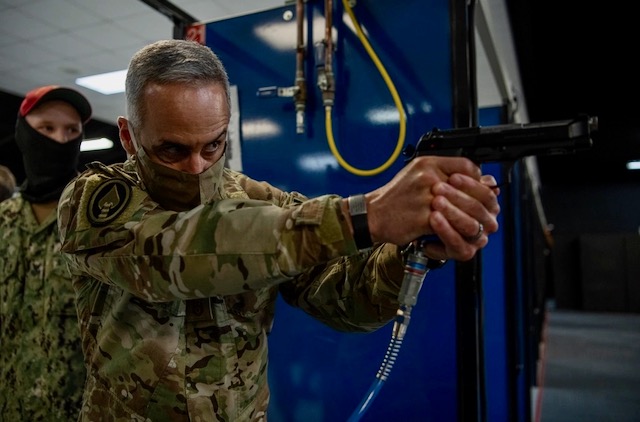The most senior enlisted service member shared a simple strategy for defeating China in a possible conflict March 8.
“Shoot them in the face,” Senior Enlisted Advisor to the Chairman of the Joint Chiefs of Staff Ramón Colón-López said at the AFA Warfare Symposium, when asked to describe in five words how to defeat the People’s Republic of China.
However, Colón-López cautioned that should a war break out, the U.S. military would target the People’s Liberation Army, not the Chinese people themselves.
“It’s the PLA that we’re actually going to go toe-to-toe with,” he said. “Are we going to go ahead and kill all Chinese, because we’re at war with them? Or are we going to go ahead and [follow] the rules of war and fight military-to-military? We start treading very dangerous ground when we generalize how we’re going to carry on the lethal means of military power, which is the national power, but we have to be disciplined in the execution of it.”
A pararescueman and combat veteran, Colón-López recalled several instances where his peers would say “‘we got to go out and kill all Muslims,’” he said. “Now think about that for a second. That is a pretty hateful statement when we’re fighting extremist organizations.”
If a war with China does occur, the hope would be for the U.S. military to fight the PLA until a diplomatic agreement could be reached that would allow both sides to “cohabitate the world,” he said.
China analysts have pointed out in the past that the People’s Liberation Army technically does not defend the Chinese people themselves. Rather, it is the armed wing of the Chinese Communist Party, the country’s governing body.
“The People’s Liberation Army is not the army of China,” said Brendan Mulvaney, director of the Air Force’s China Aerospace Studies Institute, in an informational video last year. “This is a very important distinction. When the interests of the Chinese Communist Party align with the interest of the people’s republic, then the PLA will protect them. However, when those interests are not aligned, or when they’re in conflict with the party, then the party will use the party’s armed wing, the PLA, to protect the party’s interest.”
That conflict of interest is what led to the 1989 reprisal at Tiananmen Square, Mulvaney said. The Chinese students and citizens who gathered there did not seek to overthrow the Chinese government, the director said. Rather, they wanted a bigger voice in that government.
“They wanted more democracy and a hand in the governance of China,” he said. “This was in no way a threat to the government of the PRC, but it was a direct threat to the Chinese Communist Party because it threatened to weaken their grip on power.”
When the CCP deployed the PLA in response, it killed, injured, or jailed thousands of Chinese citizens, according to the State Department. In his comments at AFA, Colón-López seemed to make the same distinction between the PLA and Chinese people that Mulvaney made.
“We have to be very very careful about generalizing,” said the pararescueman, who received the Bronze Star with Valor for defending a damaged helicopter during a 2004 mission in Afghanistan.
“I said ‘shoot them in the face,’ which is necessary a lot of times in combat,” he said. “But remember that a warrior fights not because he or she hates what’s in front of him, but because he or she loves what they left behind. And I love every single one of you.”

